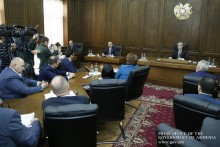News
Statement by Prime Minister Hovik Abrahamyan during Presentation of 2016 State Budget Bill at Joint Session of National Assembly Standing Commissions
02.11.2015

Prime Minister Hovik Abrahamyan made a statement during presentation of 2016 State budget bill at the joint session of National Assembly standing commissions. Addressing the audience, the Prime Minister said: “The 2016 budget bill is first and foremost based on the postulates of realism and stability. As I said earlier, all the commitments assumed in line with our estimates must be met, regardless of economic developments. Armenia’s 2016 budget has a clear-cut social bias. This is evidenced by the fact that about half of expenditure targets the social sector, as well as education, culture and healthcare.
Spending on defense, enforcement of public order and national security is meant to ensure our viability in the aforementioned areas. We will continue to provide financial assistance to the Nagorno-Karabakh Republic.
Fiscal developments in our region suggest that promising rapid improvements in terms of economic growth and higher living standards amid the ongoing global structural changes and tense geopolitical developments would be a populist and dishonest approach.
Many reputable economists and international organizations describe the developments in 2015 as more severe for the region than the crisis of 2008-2009. The volatile energy prices-caused fluctuations of exchange rates in the Russian Federation resulted in drastic decline in remittances. This in turn slowed down our country’s economic growth potential, highlighting the need for more effective welfare programs.
Under these circumstances, the past 9 months’ economic growth of 3.6% registered in Armenia reflects our approach to the problem: in order to uphold the nation’s well-being amid worsening external conditions, we need to create new jobs through investment and economic growth. We should provide as many incentives as possible for domestic manufacturers and exporters in a bid to provide conditions necessary for long-term economic growth.
Against the background of shrinking economic growth, in parallel to the structural and institutional transformations specified in the Government’s program, fiscal stability becomes crucial to the business environment in terms of both ensuring and streamlining the projected level of budget receipts, as well as creating equal conditions for all economic entities. In this regard, of paramount importance is the adoption of a new tax code in the Republic of Armenia. I gave steering instructions to the Ministry of Finance during the design of this bill, namely:
• Target long-term development instead of focusing on short-term results
• Put the emphasis on the taxation of consumption in our drive for enhanced competitiveness and investment attractiveness
• Take the country’s short-term and long-term stability as the main axis of development. The reforms should lead to consecutive rise in budget revenue based on increased efficiency in tax collection and better conditions for taxpayers
• Provide for the gradual replacement of benefits with subsidies, but only when it is possible to provide targeted compensation to vulnerable households.
• Reforms should be phased over 3-5 years in order to ensure stability and smooth transition in the fiscal sector
• Envisage gradual sophistication of taxation mechanisms and tax administration to ensure more equitable taxation conditions
Proceeding from these principles, the Ministry of Finance has developed a new tax code, which is being circulated by the Government. All the ministries and agencies are currently discussing it with the public stakeholders. While the final version has yet to be submitted to the National Assembly, I would appreciate your active involvement at this stage of debate.
Budget debate is the appropriate platform for the Government to discuss its activities in a comprehensive manner, get effective feedback and take the right decisions.
As I noted earlier, looking at the problems from the strategic viewpoint rather than from the perspective of short-term gains, we have been trying to give preference to long-term benefits over the temptation of short-lived advantage.
I hope that the panel discussions will take place in this very logic and we may come to the right decision through dialogue. We hope for your support. Thank you.”
